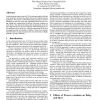Free Online Productivity Tools
i2Speak
i2Symbol
i2OCR
iTex2Img
iWeb2Print
iWeb2Shot
i2Type
iPdf2Split
iPdf2Merge
i2Bopomofo
i2Arabic
i2Style
i2Image
i2PDF
iLatex2Rtf
Sci2ools
117
click to vote
ASPDAC
2005
ACM
2005
ACM
Process variation robust clock tree routing
As the minimum feature sizes of VLSI circuits get smaller while the clock frequency increases, the effects of process variations become significant. We propose a UST/DME based approach to perform simultaneous non-zero clock skew scheduling and clock tree routing, taking into consideration the effects of process variations on clock skews. Our approach ensures that the generated clock tree has a high tolerance to process variations while minimizing the total capacitance of the clock tree, which is proportional to the total wirelength and the total number of buffers. Monte Carlo simulations show that our approach generates clock trees that are highly tolerant to process variations.
Related Content
| Added | 13 Oct 2010 |
| Updated | 13 Oct 2010 |
| Type | Conference |
| Year | 2005 |
| Where | ASPDAC |
| Authors | Wai-Ching Douglas Lam, Cheng-Kok Koh |
Comments (0)

